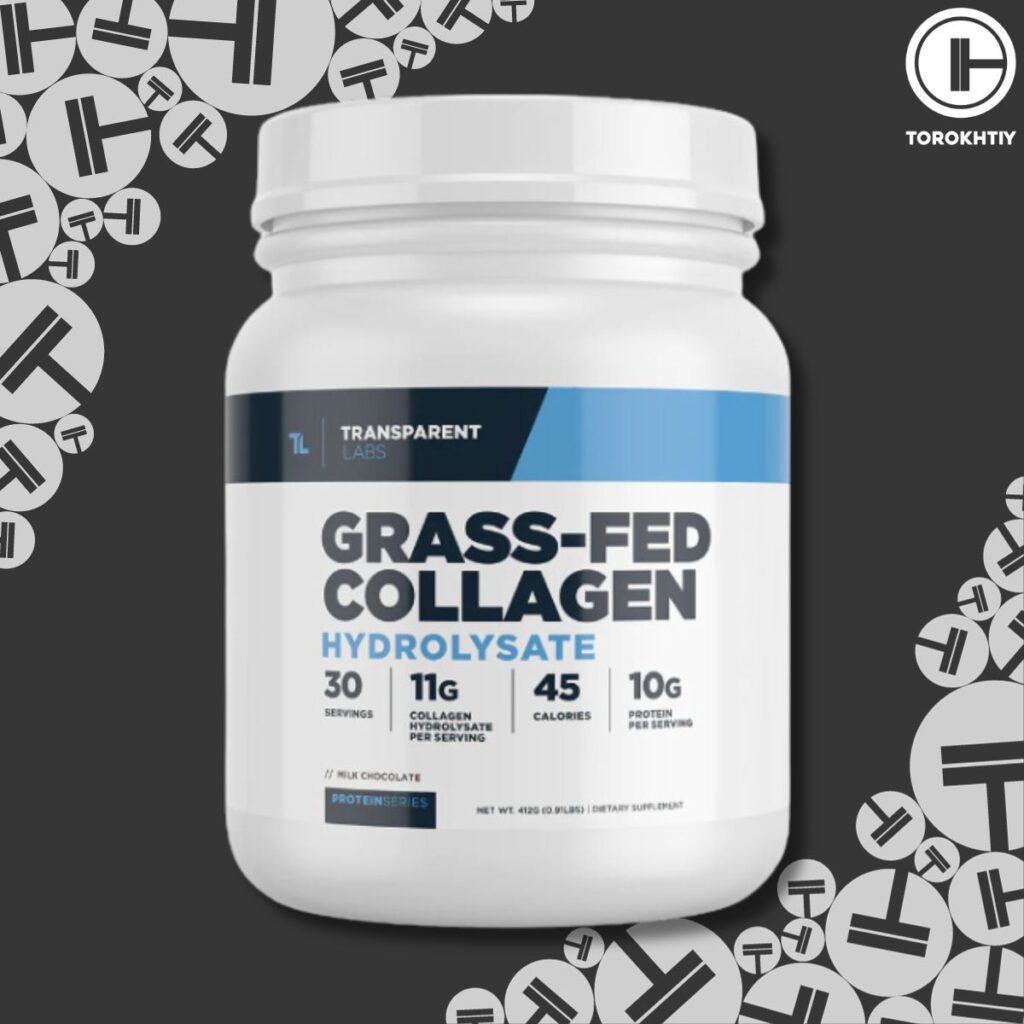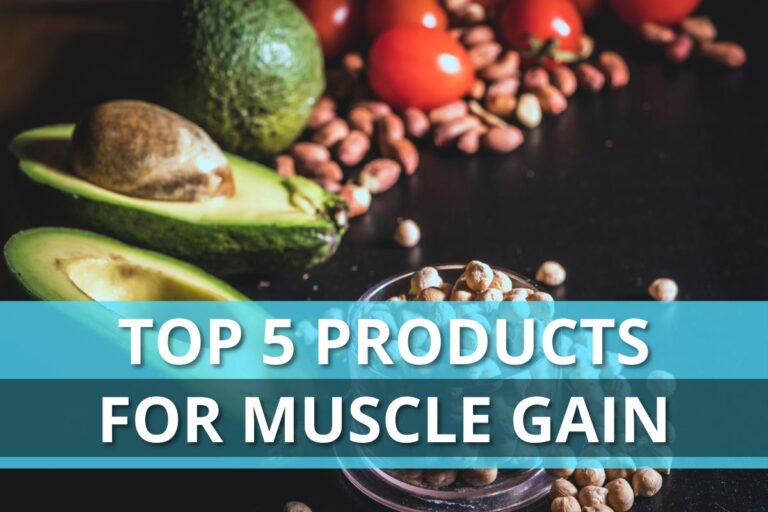Can You Take Too Much Collagen? How Much Is Too Much
No matter how high the praises for a supplement, too much of anything is not good. The same goes for collagen as a lot of people ask, can you take too much collagen? Even with all its potential benefits, it is better to keep yourself informed before taking large doses.
Even though the available research on excess collagen dosage is limited, it’s better to stick within the recommended doses of 2.5g to 15g. As for can you take too much collagen? Add small amounts of collagen supplementation to your regular balanced meals to check how your body responds.

What Is Collagen And What Are Its Potential Benefits?
Collagen, the most abundant protein in the body, generates a fibrous structure essential for connective tissues. This protein is found in bone, skin, muscles, tendons, and cartilage. It provides strength and flexibility and allows tissues to withstand tensile force while remaining intact.
Collagen supplements are predominantly derived from animal flesh, particularly the connective tissues of meat and fish. However, most if not all animal and plant-based proteins provide the necessary amino acids for collagen creation within human bodies.
Collagen synthesis generally declines as we age, and is further impacted by smoking, excessive alcohol use, and insufficient sleep and exercise. Environmental variables can cause collagen fibers to thin and weaken, resulting in surface skin wrinkles.

There are 28 different types of collagen in the human body, and the most common ones are Type I, II, and III.
- Type I collagen is found in the skin, tendons, ligaments, organs, and bones. It helps with skin elasticity, wound healing, and scar tissue development.
- Type II collagen forms hyaline cartilage on joint surfaces.
- Type III collagen promotes healthy skin, hair, nails, muscle, and bone. Limited studies also suggest that Type III collagen enhances cardiovascular health as well. It is frequently present with Type I collagen.
Here are the major benefits of collagen.
✅ Achieve Healthy Aging
Collagen synthesis declines as we age. Hence, supplementation with collagen types I and III may help to compensate for this drop.
✅ Enhance Skin Elasticity
Collagen types I and III also enhance skin elasticity, improving its appearance and texture. Research indicates collagen peptide supplements enhance skin elasticity in elderly women.
✅ Strengthen Bone and Muscles
Moving on, collagen helps to maintain bone strength and structural integrity. Research shows that, combined with resistance training, collagen contributes to increased muscle mass and reduced fat mass in elderly men. Keep in mind though, for the purposes of muscle growth and maintenance, all animal muscle proteins and many plant proteins will be more effective (more complete amino acid profile) and cheaper.*

In addition, collagen type II supports cartilage health and can strengthen joints in the knees, back, and jaw.
✅ Improve Nail Health
Supplementation may promote healthy-looking hair and nails while strengthening the nail bed structure.
How Much Collagen Is Too Much
While it is necessary for tissue health, excessive collagen consumption is possible. Collagen synthesis decreases by around 25% by 40 years and maybe more than 50% by 60 years. Toxins in the environment, smoking, drinking, and sun exposure contribute to collagen loss. High UV doses, in particular, can destroy dermal collagen and elastin.
Individual needs and sources vary. Hence, it is difficult to know if you’re taking too much collagen peptides. As a general guideline, it’s safe to take up to 20 grams per day.
Can You Take Too Much Collagen?
People often wonder when to stop taking collagen. In short, if you’re taking collagen supplements and feel negative side effects, it’s probably best to stop taking collagen.
Collagen supplementation may have benefits, however excessive consumption also poses risks. So what happens if you take too much collagen, let’s find out:
1. Possible Digestive Discomfort (Both Through Collagen Itself and Through Additional Ingredients in the Supplement)
Although collagen supplementation is usually regarded as safe, excessive use may cause gastrointestinal discomfort such as bloating, diarrhea, or an upset stomach.
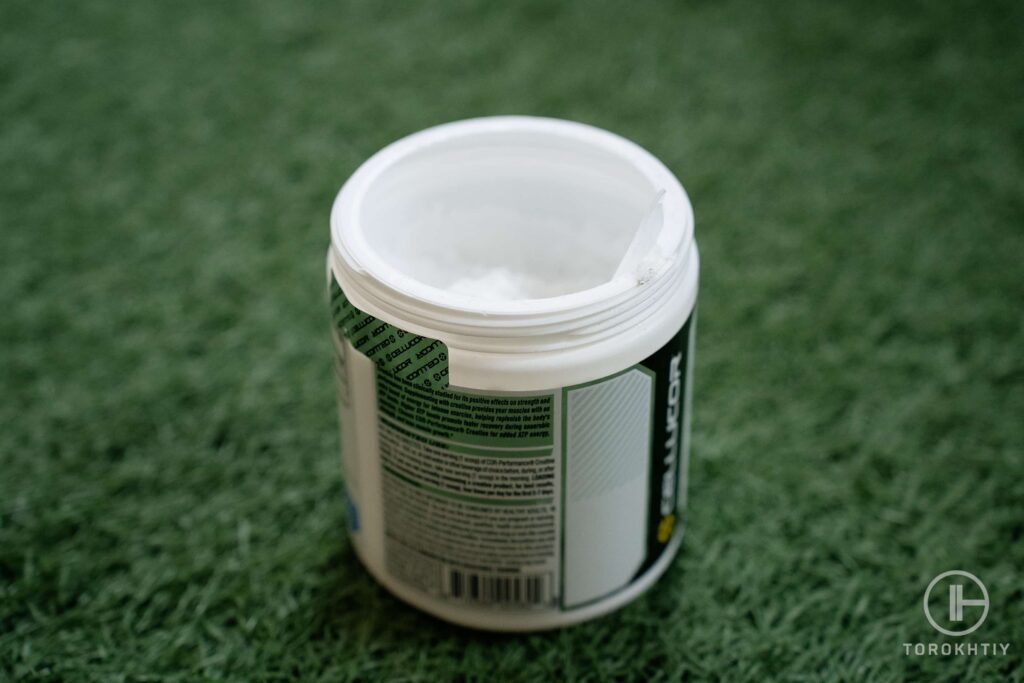
2. No Clear Dosage Guidelines
Individual heterogeneity and a lack of defined dose standards make it difficult to determine a specific threshold for excessive collagen intake. Since there is no accurate threshold, users run the risk of overdosing.
How To Support Natural Collagen Production?
While collagen synthetic decline is inevitable, you can maintain collagen levels in the body naturally even as you age.
1. Maintain Enough Sun Protection and Vitamin D Levels
Protecting yourself from the harmful effects of UV radiation on your skin (sunscreen, protective clothing) might mean you do not get enough vitamin D via natural synthesis. If you have concerns about your vitamin D status it is best to get your blood levels checked. Then, if you are deficient/insufficient you can ask your doctor or other qualified practitioner about supplementing.
2. Make Quality Sleep a Priority
Adequate sleep (about 7-9 hours every night) supports adequate collagen formation. Quality sleep promotes the body’s natural healing mechanisms. This aids the maintenance of healthy skin and tissues.
3. Avoid Smoking and Manage Your Stress Levels
It is critical to avoid smoking and limit your exposure to secondhand smoke. Smoking drastically reduces collagen levels and hastens skin aging, among many other severe health consequences.
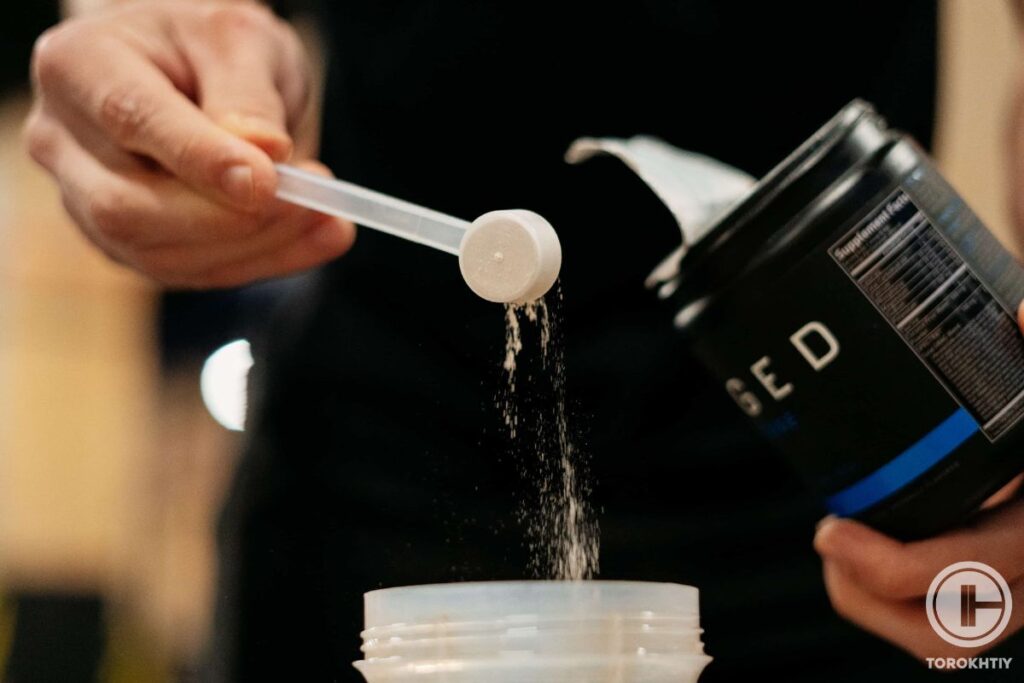
Furthermore, stress management is critical, as persistently elevated cortisol levels can impair collagen synthesis.
4. Get Regular Exercise
While the direct association between exercise and skin quality is not entirely understood, research shows that regular physical activity can reduce cell activity. Exercise benefits health in countless ways, one of which being the maintenance of connective tissues.
5. Choose the Right Collagen Supplements
Choosing the correct collagen supplement is important based on individual demands (see our recommendation below). Particular collagen forms are available from various sources, including bovine, chicken, fish, and eggshell membrane, each catering to particular health concerns. As an example:
- Types I and III bovine collagen are preferred for muscle health and post-workout recuperation* (see above).
- Chicken collagen (Type II) promotes cartilage and joint health and is frequently supplemented with chondroitin sulfate and glucosamine sulfate.
- Fish collagen (Type I) is easily absorbed and beneficial to skin, joint, and muscular health.
- Eggshell membrane collagen (Types I, IV, and X, mostly Type I) is appropriate for ovo-lacto vegetarians and promotes joint and connective tissue health.
6. Consider Supporting Nutrients
Supplementing collagen with minerals such as vitamin C and manganese (if insufficient) can improve collagen health and general well-being. These supplements help to satisfy nutritional shortages while promoting collagen production and maintenance.
Collagen Powder We Recommend for Skin Health, Joints, Tendons & Athletes
Transparent Labs Collagen Hydrolysate
- Collagen Source: Grass-fed Hydrolyzed Bovine Collagen Peptides
- Suitable For Vegans: No
- Serving Size: 11 grams
- Price Per Serving: ~$1.2
- Protein: 10 grams
- Sodium: 35 milligrams
- Fat: 0 grams
- Added Sugar: 0 gram
- Calories Per Serving: 40
- Company Founded: 2015
- Recommended By Athletes: Hafþór Júlíus Björnsson, Terron Beckham, Paul Sklar
Transparent Labs Collagen Hydrolysate is a high-quality joint-support supplement derived from grass-fed cow collagen peptides. This hydrolyzed version offers excellent mixability and absorption. It reduces stomach difficulties typical with lower-quality collagen supplements.
The supplement is third-party tested to ensure quality by removing impurities, pathogenic microorganisms, and heavy metals. It lacks integrated vitamin C, a necessary component for collagen formation. Yet, the supplement is useful to promote muscle and joint strengthening.
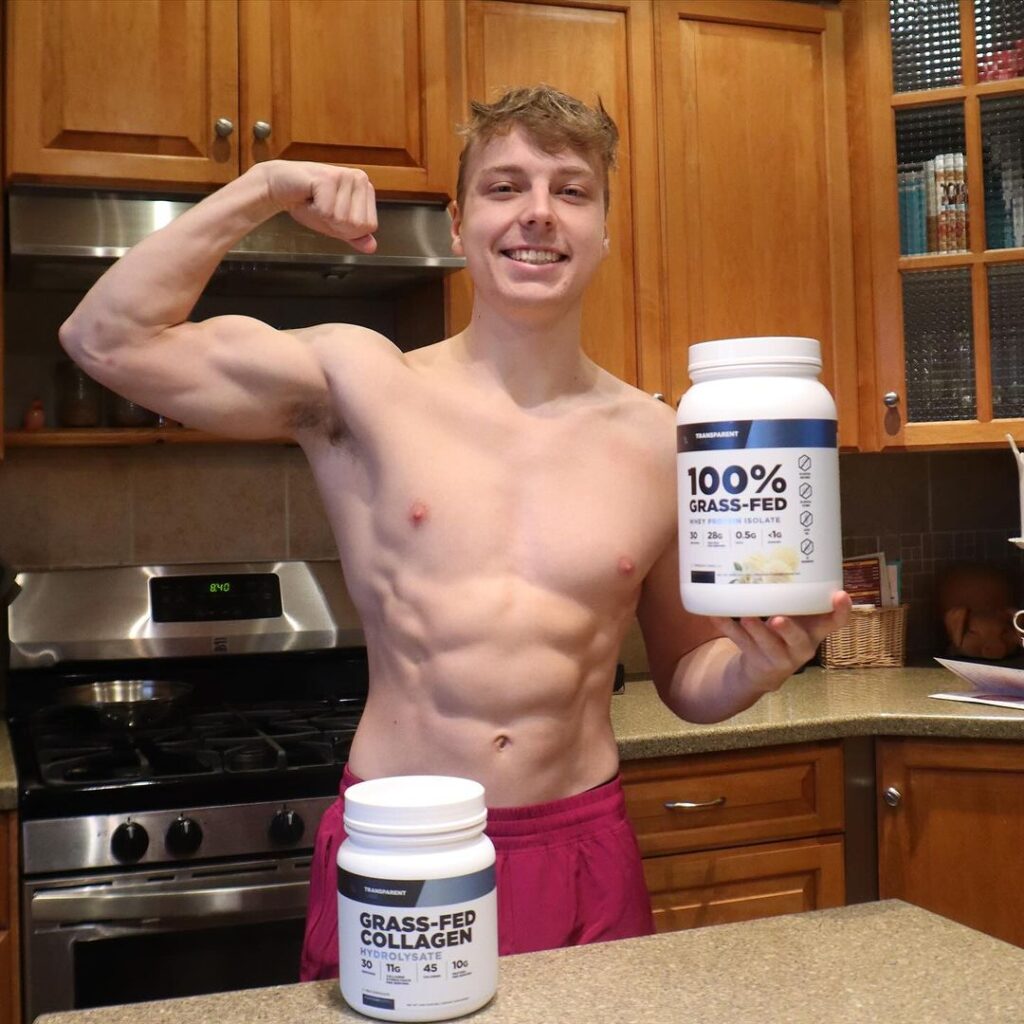
Each serving contains 10g of grass-fed collagen, 45 calories, 2g of carbohydrates, and 1g of sugar. Because of its adaptability, it may be easily included in both hot and cold beverages without affecting the flavor or leaving any trace.
Transparent Labs’ dedication to transparency has established itself as trustworthy and ethical. Hence, its collagen hydrolysate is a fantastic choice for individuals looking for a dependable and effective collagen supplement.
Positives:
Could be better:
FAQ
What Happens If You Take Too Much Collagen?
There are side effects of taking too much collagen such as indigestion, bloating, and gas. Some people may be allergic to collagen supplements. They can exhibit symptoms of too much collagen such as itching, swelling, or even anaphylaxis. In this case, quit usage and seek medical attention immediately.
Is 20g Collagen Too Much?
No, up to 20 grams of collagen every day has been tested in scientific research and is safe. It’s best to take grass-fed hydrolyzed collagen when possible.
Should You Take A Break From Collagen?
Yes, if you’re experiencing any collagen overdose symptoms. However, there is currently no evidence to demonstrate adverse effects of excessive collagen intake.
Conclusion
Collagen supplements are mostly taken to prevent the skin, hair and nails from breaking down with age. Collagen is a category of protein fibers that form the connective tissues in our bodies.
Unfortunately, as we age, we produce less and less collagen. Even though collagen supplementation can help, you should ask yourself, can you take too much collagen?
The simple answer is, maybe. The research has shown that 2.5 grams to 15 grams per day is generally well tolerated. It is best to start at a low dose and see how your body reacts to it. You can increase the dose gradually, however, it is strongly recommended that you consult your healthcare provider before doing so.
Athletes can benefit greatly from collagen supplementation. Transparent Labs Collagen Hydrolysate can aid in joint health, muscle rehabilitation, and performance. More specifically it can help to heal the connective tissues such as tendons and ligaments that are strained during exercise.
So, are you thinking about starting collagen supplements? If so, share your results and experiences in the comments section below, and if you have any queries, please do not hesitate to send us your queries!
Also read:
References:
- Amber Smith, “Can You Take Too Much Collagen?”, DiscoverMagazine, https://www.discovermagazine.com/lifestyle/can-you-take-too-much-collagen (accessed December 9th, 2023)
- Cecilia Snyder, MS, RD, “How Much Collagen Should You Take per Day?”, Healthline, https://www.healthline.com/nutrition/how-much-collagen-per-day (accessed December 9th, 2023)
- Dr. Carla Montrond Correia ND, CNS, “Can You Take Too Much Collagen?”, TakeCareOf, https://www.takecareof.com/articles/can-you-take-too-much-collagen (accessed December 9th, 2023)
- Ashley Sobel, RD, CDN, “Can You Take Too Much Collagen?”, NakedNutrition, https://nakednutrition.com/blogs/supplements/can-you-take-too-much-collagen (accessed December 9th, 2023)
- Kirsten Nunez, M.S., “Can You Take Too Much Collagen In A Day? Experts Explain”, MindBodyGreen, https://www.mindbodygreen.com/articles/can-you-take-too-much-collagen-in-day (accessed December 9th, 2023)
Why Trust Us?
With over 20 years in Olympic Weightlifting, our team does its best to provide the audience with ultimate support and meet the needs and requirements of advanced athletes and professional lifters, as well as people who strive to open new opportunities and develop their physical capabilities with us.
By trusting the recommendations of our certified experts in coaching, nutrition, dietology, and sports training programming, as well as scientific consultants, and physiotherapists, we provide you with thorough, well-considered, and scientifically proven content. All the information given in the articles concerning workout programming, separate exercises, and athletic performance, in general, is based on verified data. We ensure that you can rely on our professionals’ pieces of advice and recommendations that can be treated as personalized ones which will benefit you and fully meet your needs.
The product testing process is described in more detail here
Author: David Sasha Schulz
Doctor of Chiropractic, BSc Human Biology, CSCS
Strength coach (CSCS) – 10 years
Sasha is a Chiropractor and Kinesiologist practicing in Kelowna, BC, Canada. He has been practicing Chiropractic since 2019, integrating manual therapy, strength training and programming principles, and nutritional strategies to get his patients optimal results. He currently scratches the competitive itch in fitness, and the occasional endurance race, and plays golf and snowboards for fun. He has an interest in all strength and fitness-related sports.

